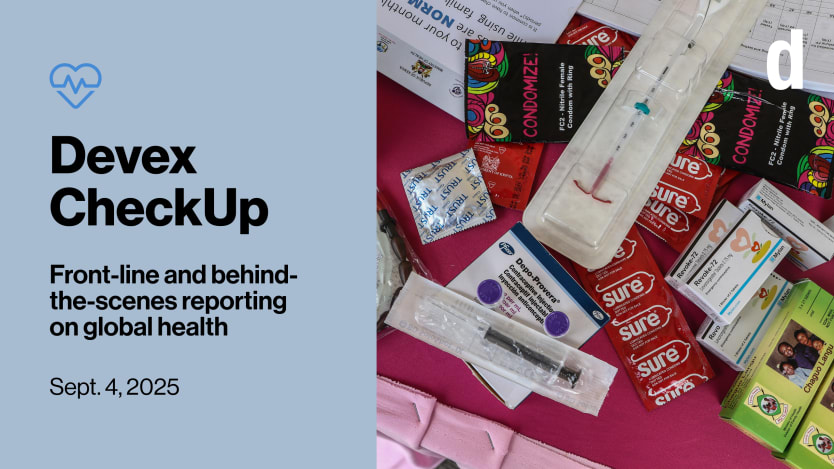Devex CheckUp: The Trump administration’s war on family planning escalates
Presented by Saudi Commission for Health Specialties

Is the United States about to destroy $9.7 billion in sexual and reproductive health commodities on dubious grounds?
The State Department told Devex in July that it plans to incinerate — at the cost of $167,000 — “certain abortifacient birth control commodities from terminated Biden-era USAID contracts.” Abortifacient is a fancy way of describing a substance that causes abortion. People who have actually seen the commodities, though, say that’s not at all what they do.
Instead, sources tell Devex the supplies were mostly condoms and long-acting contraceptives, such as implants and injectables. Not only are they not abortifacients, but they are desperately needed in communities around the world.
If the commodities are not delivered, the Reproductive Health Supplies Coalition estimates the result will be an additional 362,000 unintended pregnancies, 161,000 unplanned births, 110,000 unsafe abortions, and 718 preventable maternal deaths.
For decades, U.S. legislation has barred American aid from being used to support abortions. But sexual and reproductive health advocates said the planned destruction of these commodities is part of the Trump administration’s broader attempt to end U.S. support for family planning.
The administration has already convinced lawmakers to claw back $500 million in appropriated spending, much of which was likely earmarked for family planning. And Trump’s 2026 budget proposal would zero out family planning spending entirely.
Read: How $9.7M in lost US contraceptives disrupted family planning globally
Background reading: US Congress clears Trump's $9 billion rescissions package
More cuts
Meanwhile, the Trump administration wants to walk back more congressionally appropriated global health spending. The White House has proposed another nearly $5 billion in rescissions, which includes reclaiming $45 million allocated to the Pan American Health Organization, or PAHO.
There’s a difference between this proposal and the cancellation of $8 billion in aid earlier this year that Congress ultimately approved (after rescuing some global HIV funding): Trump has submitted this proposal so close to the end of the fiscal year — Sept. 30 — that the funds will expire whether or not lawmakers approve them. It’s a controversial process called a “pocket rescission,” and it’s not even clear that it’s constitutional. It will almost certainly fall to the courts to decide if the plan can proceed.
Though global health programs were largely spared in the latest proposed cuts, activists remain worried about future funding — particularly in light of the administration’s proposed budget for 2026, which includes nearly $2 billion in cuts to global AIDS programming.
Activists rallied near the White House on Tuesday to protest the administration’s cuts to global health programs and to demand full funding for the President’s Emergency Plan for AIDS Relief, or PEPFAR, in the upcoming budget.
Read: Trump’s $5B ‘pocket rescission’ escalates foreign aid funding fight
One big number
1 billion
—That’s the number of people living globally with a mental health condition, according to a new report from the World Health Organization.
Investments in meeting mental health challenges have not kept pace with the growing number of people who experience depression, anxiety, and other conditions. In fact, governments spend just about 2% of their budgets on mental health services — the same percentage as in 2017.
The rise in mental health conditions has disproportionately affected young adults, aged 20 to 29 years old. WHO officials aren’t exactly sure why, but they suspect social media and the COVID-19 pandemic have something to do with it.
Read: More than 1 billion people are living with a mental health disorder
Awaiting the FIND-ings
An explosive investigation from Swissinfo charts the decline — and possible fall — of the Foundation for Innovative New Diagnostics, aka FIND. Major donors, including the Gates Foundation, have suspended their support pending the outcome of an official investigation into alleged mismanagement and financial impropriety at the Geneva-based organization, which played a critical role in the COVID-19 response.
The investigators trace the problem to an unnamed board chairperson, whose travel spending and involvement in FIND’s day-to-day management raised concerns. After flagging these issues, some employees allege that they were fired and that their private emails were illegally accessed. FIND insists that no wrongdoing has occurred.
The official investigation into this messy situation is apparently finished, but the report has not been publicly released even as the future of the organization hangs in the balance.
From our archives: Global Fund’s $5B ask for COVID-19 response still lacking funds
Trimming the fat
What’s the secret to significantly cutting trans fat from food? Policymakers need to introduce restrictions on the production of trans fat — a chemical responsible for more than 278,000 deaths each year — and then rigorously monitor and enforce those policies. That’s according to health officials from four of the nine countries that have successfully eliminated trans fat from food manufacturing.
In an opinion piece for Devex, written with WHO Director-General Tedros Adhanom Ghebreyesus, the health officials are urging their counterparts in other countries to learn from what has worked in their countries, including efforts to partner with food and beverage manufacturers to eliminate trans fat from products.
They also emphasize the importance of the draft declaration to be tabled at the United Nations General Assembly’s high-level meeting on noncommunicable diseases. It includes a call to remove trans fatty acids from food. The idea is that this is the next step following individual country efforts and a global WHO initiative that has grown the number of countries with trans fat elimination policies from 11 in 2018 to nearly 60 now.
Opinion: Now is the moment to eliminate a human-made health challenge — trans fat
+ For more content like this, sign up for Devex Dish, our free, weekly newsletter covering the transformation of the global food system.
What’s next
Want to know what’s in fashion this fall? Philanthropic giving that does more than maintain existing programs but encourages broader systemic change and removes barriers to progress.
At least, that’s what Founders Pledge would like to see. The initiative that allows entrepreneurs to dedicate their personal wealth to charity has phased out its Rapid Response Fund. Created in the wake of the USAID funding cuts to try to keep programs afloat, it raised $13 million over the last six months and — according to its own estimates — is projected to save more than 4,000 children’s lives.
Your next job?
Expert Vaccine Preventable Diseases and Immunisation Programmes
European Centre for Disease Prevention and Control
Sweden
But interest in sustaining USAID-funded projects is waning. So in its place, Founders Pledge has introduced a Catalytic Impact Fund, which aims to identify long-term, transformative projects. The idea is to boost them with some initial capital while helping them source additional investments.
The effort has a distinctive health focus, with early projects that prioritize removing barriers to accessing new drugs in low- and middle-income countries and reshaping tax policies so that they might benefit health systems.
Read: Philanthropic initiative launches long-term fund to replace USAID stopgap
+ Devex Pro members can watch a briefing that discussed how philanthropy can better fund development. Not yet a Pro member? Start your 15-day free trial today to access all our expert analyses, insider insights, funding data, events, and more. Check out all the exclusive content available to you.
What we’re reading
Former leaders of the U.S. Centers for Disease Control and Prevention accuse Secretary of Health and Human Services Robert F. Kennedy Jr. of putting children at risk and raising the potential of another pandemic. [BBC]
A commonly prescribed blood thinner, clopidogrel, is more effective at preventing heart attacks and strokes than aspirin, according to new research. [The Guardian]
PAHO wants countries in the Americas to strengthen their surveillance and response to both chikungunya and Oropouche viruses, including taking specific steps to stop the insects responsible for spreading these arboviruses. [CIDRAP]
Search for articles
Most Read
- 1
- 2
- 3
- 4
- 5








